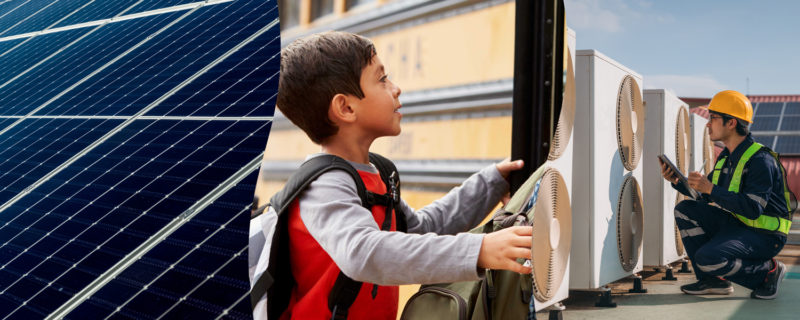Illinois has made historic progress in building a thriving and equitable clean energy economy with the passage of the Climate and Equitable Jobs Act (CEJA). We are working to bring CEJA’s programs, along with federal climate investments, directly to the communities that need it the most. This work will help hasten the transition to clean energy, clean up pollution, and lessen the impacts of climate change.

Despite these wins, Illinois still has more work to do in reducing emissions and averting catastrophic climate change. Illinois communities continue to struggle with the impacts of pollution, extreme weather, and undue consumer burdens. Even with the passage of CEJA, Illinois remains the 7th most climate polluting state in the nation. Electrifying transportation and buildings will require a greater expansion of renewable energy and the electric grid than CEJA’s goals. We urgently need to accelerate clean power development, and address sectors beyond the electric grid, like transportation and buildings.
We need your help advocating for the future of climate policy at Climate Lobby Day on May 9th in Springfield! Please join us. There are buses coming from across the state – click here to see if there’s one from your community and sign up!
Prairie Rivers Network is a proud member and leader of the Illinois Clean Jobs Coalition (ICJC), the same Coalition that developed and fought to pass CEJA, with our members’ support. We are now working with the ICJC to advance the following Policy Platform Goals addressing carbon emissions and reliability in the power, transportation and building sectors.
- Clean Power: Achieve 100% clean renewable power by 2050, and a fossil fuel-free power grid by 2035
- Clean Transportation: Achieve a zero-emissions transportation sector through expanding walking, biking, public transit, and electric vehicles
- Clean Buildings: Deploy energy efficiency and electrification to enact a planned and equitable transition away from fossil fuel use in buildings, to achieve 100% clean buildings by 2050.
Clean Power
Goal: Achieve 100% clean renewable power by 2050, and a fossil fuel-free power grid by 2035.
CEJAs biggest wins came in our power sector (i.e. electricity generation sector), with clean energy goals and plans to close fossil fuel plants beginning in 2030. Unfortunately, Illinois is behind in hitting our clean energy goals. Many Illinoisans, namely those served by Rural Electric Cooperatives and Municipal Utilities, do not have the same access to CEJA’s clean energy benefits and programs. Additionally, our grid is in need of investments to prepare for more clean energy including increasing battery storage, expanding energy efficiency, and accelerating transmission line upgrades. We must also ensure equitable consumer protections for policies that have rate impacts and improve affordability for economically disadvantaged ratepayers.
Illinois should take important steps to improve upon CEJA’s power sector reforms to ensure we meet our clean energy goals, expand energy efficiency, improve transparency for munis and co-ops, update the grid, and keep electricity prices low.
Clean Transportation
Goal: Achieve a zero-emissions transportation sector through expanding walking, biking, public transit, and electric vehicles.
CEJA put Illinois on the map for climate leadership, but according to a recent scorecard by our ICJC partners at NRDC, Illinois ranks 21st in the nation when it comes to a clean and equitable transportation system. The transportation sector is the largest contributor of greenhouse gas emissions (32.6%) in Illinois. In addition to warming our planet, pollution from fuel-powered vehicles is damaging our health. Our ICJC partner, Respiratory Health Association, released a study that found, “exhaust from diesel engines will lead to more than 5,000 asthma attacks, nearly 200 heart attacks, and 416 premature deaths across the state in 2023 alone.”
We must expand modes of transportation, including investing in public transit and projects that make walking and biking safer. Illinois must adopt clean vehicle standards like the Advanced Clean Trucks (ACT) and Advanced Clean Cars II (ACC II) rules to facilitate the transition to electric vehicles. Investments in clean and equitable transportation will result in gains to public health, statewide economic benefits, and clean energy jobs.
Clean Buildings
Goal: Deploy energy efficiency and electrification to enact a planned and equitable transition away from fossil fuel use in buildings, to achieve 100% clean buildings by 2050.
While we have made strides in Illinois to reduce fossil fuel pollution from the electricity sector, nearly 80% of Illinois residents rely on burning gas in their homes and buildings. Emissions from fossil fuels burned in buildings contribute to climate change and harm our health. Building sector emissions account for 22% of IL carbon emissions. Children are especially vulnerable to harmful pollutants and are much more likely to experience asthma if they live in homes with gas-burning stoves. The elderly and those with chronic illnesses also spend more than 90% of their time indoors, leaving them more vulnerable to indoor air pollution from methane-burning appliances like gas stoves.
“Building electrification” refers to the process of transitioning away from fossil fuel based energy sources for heating, cooling, cooking, and hot water, and instead utilizing electricity as the primary source. To meet our goals, this transition relies on ensuring the electricity comes from clean, renewable sources from the power sector. Additionally, improving building efficiency through insulation, energy-efficient appliances, and smart technologies can reduce overall energy demand. These strategies not only contribute to decarbonizing the building sector, but also promote cleaner air, improved public health, and enhanced energy resilience.







